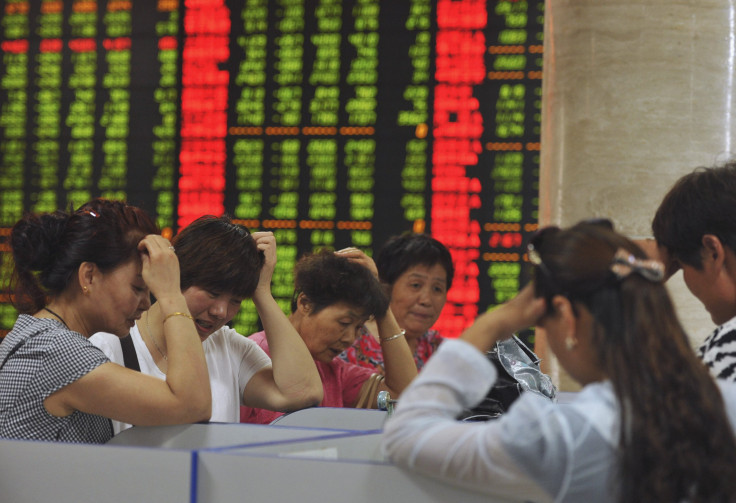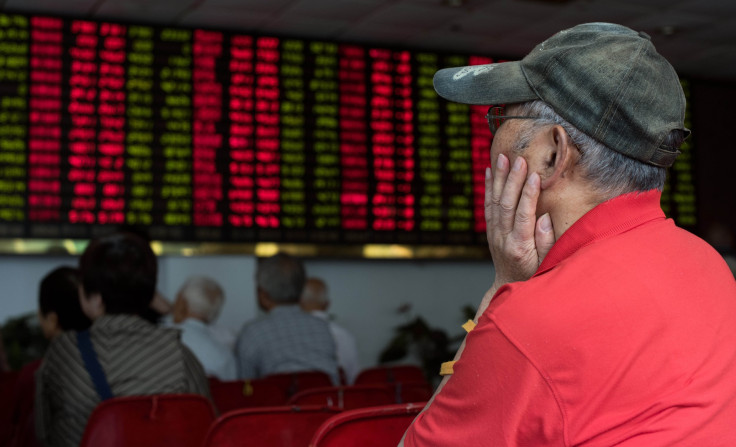Asian Markets Tumble, Fears Loom That Dow Jones Industrial Average Will Follow

UPDATE 12:01 a.m. EDT: Investors around the globe were rattled Monday as the Shanghai Composite Index plunged more than 8 percent, wiping out this year's gains. The Wall Street Journal reported the dive also took a number of currencies to multiyear lows as indexes elsewhere also fell.
At noon, the Shanghai Composite was off 8.45 percent, the Hong Kong Heng Seng shed 4.3 percent, Japan's Nikkei was off 4 percent and the Singapore Straits Times dipped 3.2 percent. The Australian S&P/ASX 200 was off 3.5 percent and India's Sensex was down 2.3 percent.
UPDATE 11 p.m. EDT: By late morning, the Shanghai Composite losses were approaching 8 percent, while Hong Kong's Heng Seng was off nearly 4 percent, Japan's Nikkei was down more than 3 percent and the Singapore Straits Times was down more than 2.7 percent.
Original post:
Asian stocks headed lower Monday, sparking fears of another bloodbath on Wall Street in the wake of Friday's sell-off. China's Shanghai Composite was down nearly 6 percent in early trading while Hong Kong's Heng Seng dipped 1.5 percent, and Japan's Nikkei 225 and Singapore were both off more than 2 percent.
Friday's sell-off sent global shares to their weakest level since last October amid concerns surrounding overseas losses in emerging markets would infect U.S. stocks, Bloomberg reported. Fears sent junk bond yields soaring to a three-year high while Treasurys saw their best weekly gain in nearly five months.
He Fan, an economist at Caixin Insight Group, told the China Post Beijing is under pressure to maintain growth rates, likely meaning it "needs to fine tune fiscal and monetary policies" further. Nomura economists said they expect "monetary policy easing to continue."
Shanghai stocks dove 4.27 percent Friday on the heels of an independent survey that found China's manufacturing activity fell to a 77-month low in August, the Post said. The preliminary reading of 47.1 on the Caixin Purchasing Managers' Index was the worst since March 2009's 44.8.

The recent turmoil led angry investors to seize the head of a Chinese exchange and hand him over to Shanghai police, but he was later released without charge, the Financial Times reported. The Fanya Metals Exchange, based in Kunming, stopped making payments on financial investment products in July after first experiencing liquidity problems in the spring. It's one of several exchanges contributing to China's financial problems.
The recent slide in global stocks sparked by Beijing's devaluation of the yuan is making U.S. Treasurys an attractive investment again. The Wall Street Journal predicted the rush to safety could push the 10-year note back under a 2 percent yield.
The People's Bank is expected to cut bank reserve-requirement ratios for Chinese banks by a half percentage point, which could free up $106.2 billion (678 trillion yuan) for investment.
China's State Council Sunday opened the gates for stock market investment by the country's pension fund. The council issued a final guideline allowing the pension fund to invest in new products but puts a 30 percent lid on such investments, Xinhua reported.
The move is intended to increase the fund's value as China faces an aging population that is expected to make up a third of the country by 2050. Currently, seniors make up 10 percent of China's population. The fund, which holds 90 percent of China's social security fund pool, was worth $547 billion (3.5 trillion yuan) at the end of last year.
© Copyright IBTimes 2024. All rights reserved.





















